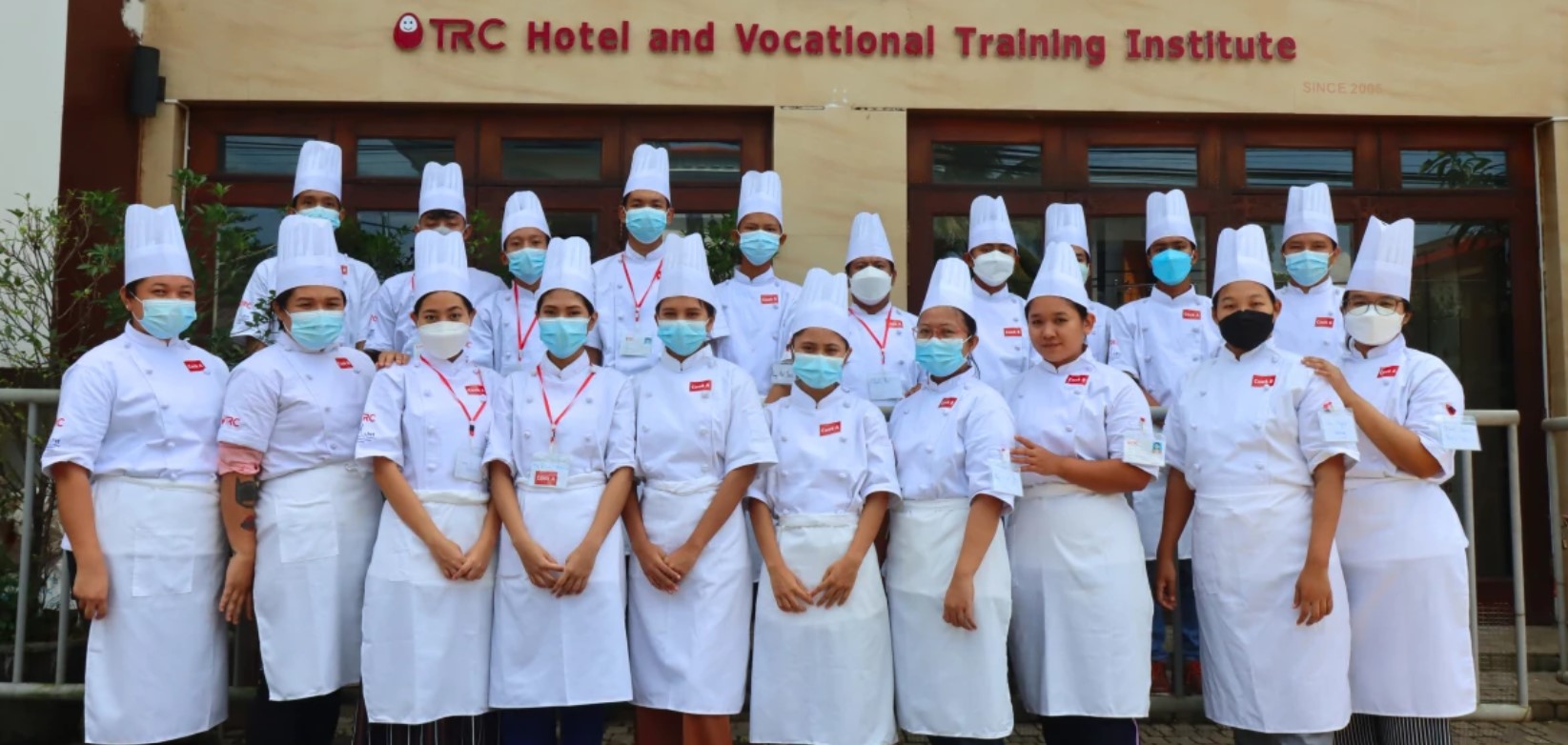
Skill development is key when it comes to mitigating risk factors in the labour market and other job insecurities. It can also positively benefit individuals, employers, and the economic development of the country. Myanmar has been severely impacted by the COVID-19, political instability, and socio-economic crises. As a result, regular people are facing increased social and economic challenges in their daily lives. Women and young people are particularly vulnerable members of society, as they face limited job opportunities, increased food insecurity, dismal living and a general lack of good quality social support services.
The Aye Chan Thaw Ein (ACTE) Project is supported by People in Need (PIN), Helvetas Myanmar and the Myanmar Private TVET Association (MPTA). Together, these organisations, along with multi-private sectors in the Shwe Pyi Thar Township, market actors, skill workers, and construction work and entrepreneurs’ contractors, all work to improve the labour conditions and income of migrant workers and young people by providing vocational and soft skills training to further skill development.
As a part of the project activities, MPTA conducted a labor market assessment in April 2020, and identified the need for skill development among migrants and young people from the host community. Throughout the project, MPTA has strengthened their soft skills, as well as helped them hone more technical and vocational skills, through various trainings aimed at gaining new employment opportunities. A total of 820 migrants and young people have benefited from the skill development trainings.
Bring opportunities for skills development
Kyaw Kyaw*, one of the trainees of the Hair and Facial Treatment Training shares his career development dreams for the future. “Shwe Pyi Thar Township is one of the poorest peri-urban areas of the Yangon region and a number of internal migrants live here. Thanks to the ACTE Project and donors for providing free-of-charge vocational soft skills training us. Later in my career, I plan to apply these new skills and become a professional hairdresser. I want to open a barber shop. Now, I am trying my best in the ten weeks of training, and learning how to apply other skills like public speaking, time management, self-marketing and CV writing.”
In regard to the skill development trainings, MPTA has adapted existing curricula (including skills standards, guides about the curricula of the learner and instructor, as well as the qualification handbook and skills assessment) in order to provide feasible and cost-effective trainings for the peri-urban environment. The project is also working with local market actors in eight beauty salons owners and four training institutes.
Additionally, MPTA has trained 61 employers and trainers (E&T). Eight of these employer trainers received training on pedagogical skill instruction, coaching and assessment. Those employer trainers helped identify trainees, conclude contracts within the project and conducted their own trainings (typically lasting two to four months duration). The experienced coaches of MPTA are then able to coach the employer trainers themselves and train using a standardised skills assessment.
Ma Ei*, a 34-year-old beauty salon owner, and the employer trainer of the Hair and Facial Treatment Training, shares her experiences about hosting trainees and acting as a trainer. “I want to share my knowledge and skills with young people who are willing to develop their career in the hair and beauty profession. With the project’s support, I am able to organize trainings at my beauty salon and train trainees using the qualification handbook and the guidebook I received from MPTA. So far, I’ve hosted four rounds of Hair and Facial Treatment Training and trained nearly 50 people.”
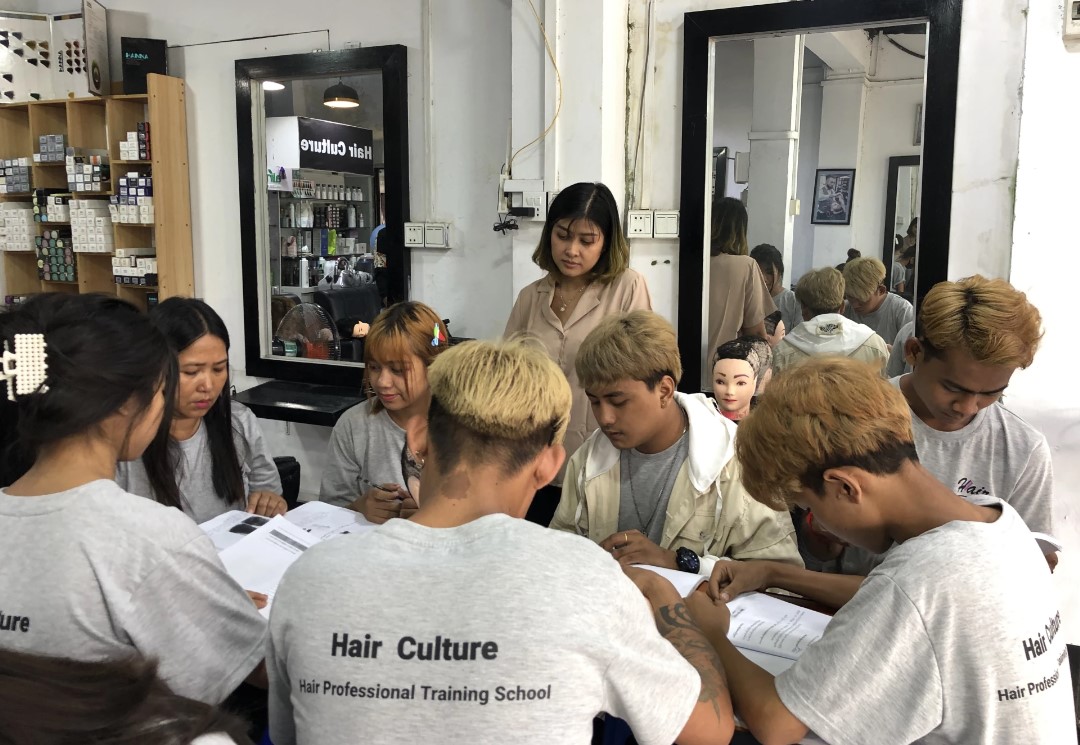
She adds, “one round of trainings takes 11 weeks, including on-the-job training (OJT). Mostly, young people between the ages of 18 and 20 join the training and all of them are actively learning the skills until they finish the training and receive the certificate. With the certificate, they can gain employment in beauty industry as a skilled worker and they can continue developing their career by applying these new skills in future.”
Ma Kyu Kyu Win, a project manager for MPTA explains, “due to the continued unstable health and security situation in the country, our implementation process of face-to-face activities were temporarily pausing and slowed down in 2021. For the time being, we’ve adapted and developed the existing curricula with a focus on the technical expertise on various training content. In the first quarter of 2022, MPTA discovered alternatives ways by rent out safe spaces and networking environments with other training institutions and conducted training using virtual or semi-virtual approaches.”

She explains, “we prioritize the safety and security of all involved staff, employer trainers and trainees. Our vocational skills development training has a dual education approach including a mix of practical and theoretical classroom training, as well as on-the-job training at respective workplaces and construction sites. During the trainings, employer trainers have to conduct a pre- and post-training evaluation that includes an internal assessment of trainees’ skills and a certificate based on the result. A total of 221 trainees (63% of which were female) were able to find employment within six months of having completed the trainings.”
Tun Tun*, one of the trainees for the first round of plumbing (part of our Water Supply and Sanitary Training) shares experience, “I like to check, repair and maintain the machines if something breaks down or setting up. That’s why, I joined this plumbing training. After 143 hours, and one month of on-the-job training, I gained more knowledge about using my hands and power tools in terms of setting up the water pipes and other construction projects. I am really interested in putting this theoretical knowledge into practice. I realize that both forms of knowledge are important. Our trainers were so kind and helped us to train and they taught us everything. Currently, I am working at a construction site as a plumbing technician. My income has increased because I am a technician, and that’s thanks to this project and the trainers.”
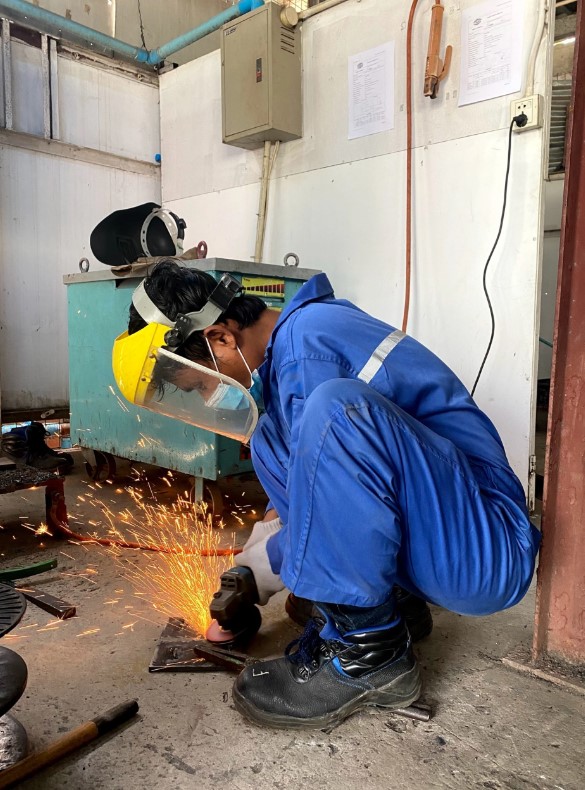
Ma Thwe Thwe Tun, a training coordinator of STAR Vocational Institute for Essential Culinary Skills (Oriental Foods) Training, says, “STAR Vocational Institute is a well-known academy in hospitality and the tourism industry in Myanmar. STAR has co-hosted 9 batches of trainings under the Aye Chan Thaw Ein Project since August 2021, together with the TRC Vocational Institutes. We have produced 319 certified kitchen helpers specializing in Chinese cuisine, Thai cuisine, fried foods and street foods. We have arranged month-long on-the-job trainings totaling around 143 hours. After joining the on-the-job (OJT) trainings, some of our trainees become employed in the OJT sites, and others plan to go for abroad with this knowledge. Others become self-employment at their own places.”
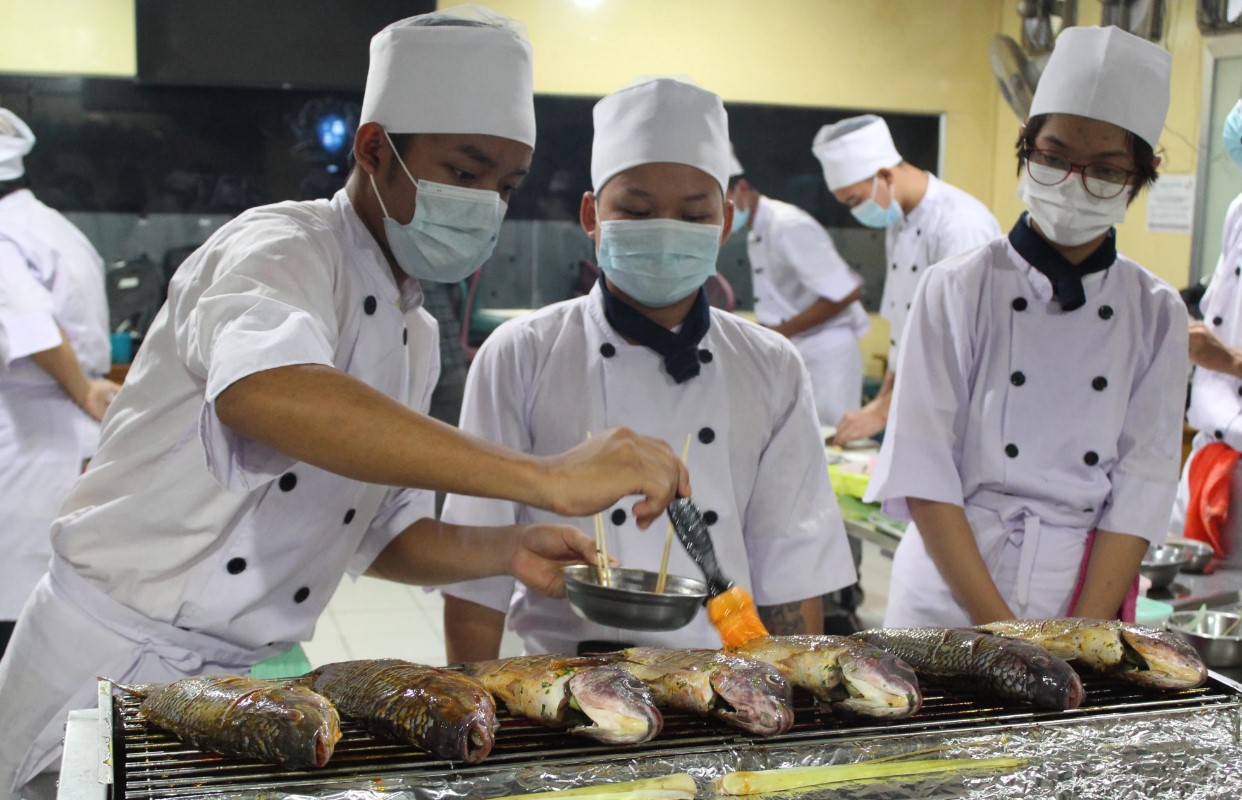
She adds, “We’ve had a total of 319 individuals, of which we had 206 were male trainees. Currently, most of the young people with cooking skills are boys and many of them want to work in hotels and restaurants abroad. In addition to basic cooking skills, our trainings provide them customer services knowledge and the knowledge of preparing fried foods or street food as a food vendor in the country of origin, all of which can increase their income.”
Skill-based Certification support for more opportunities in market
Ma Nyein Nyein Ei, the Skills and Migration Development Manager of the ACTE says, “the fact that the Myanmar Tourism Human Resource Development Association (MTHRDA) and MPTA are able to issue a joint certificate for the competent trainees of the culinary training is a remarkable milestone that enhances the credibility of the certificate, especially in food industry. In the future, it would also be good to jointly issue the accredited certificates for the skilled workers from various respective industries in country in order to gain recognition and get more market connections.”
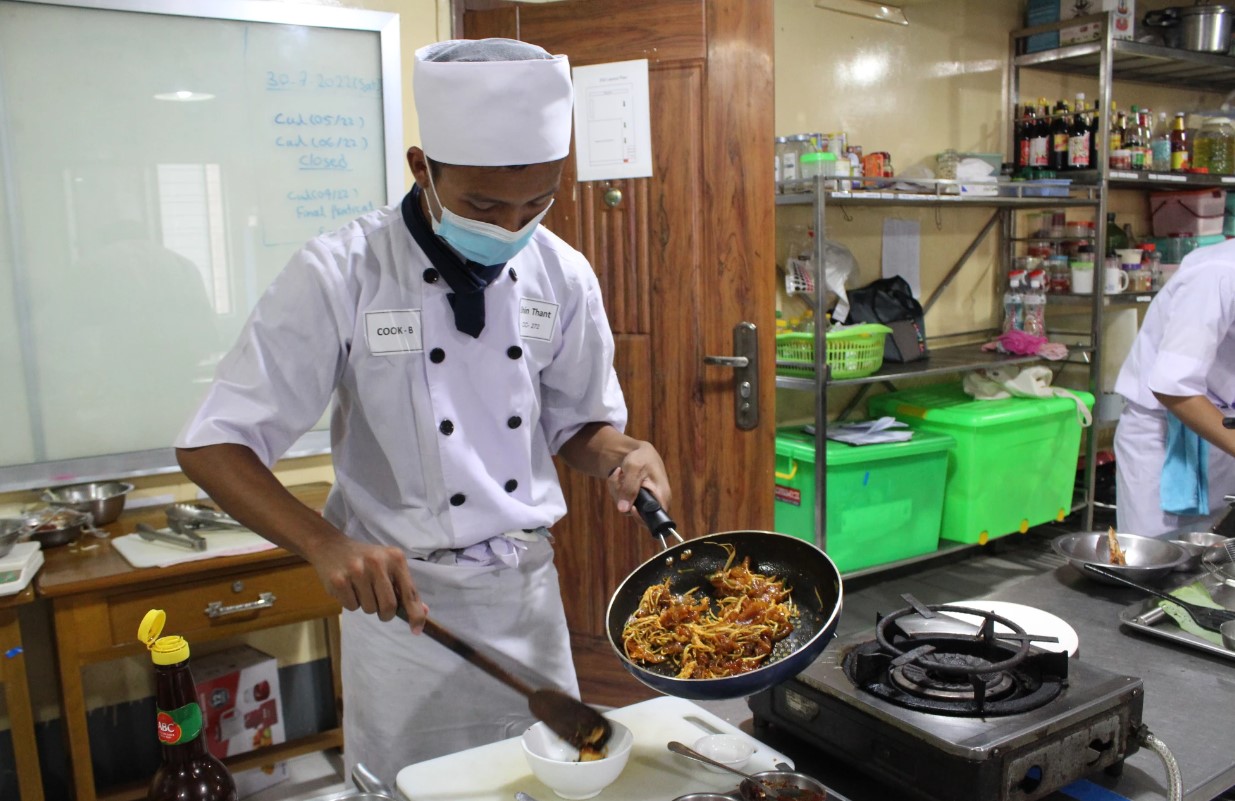
The connection between the labor market, market acceptance and policy development are of paramount importance. The project aims to support the creation of a workforce that is better equipped to handle the challenges of modern businesses. Investing in training programs and other educational initiatives will help ensure that workers have access to the resources they need to develop their skills and increase productivity.
Additionally, employers should be encouraged to provide opportunities for career advancement within their respective organisations so that employees can reach higher levels of expertise over time. Doing so will lead, not only to increased economic growth, but also greater job satisfaction among workers who are given an opportunity to succeed in their chosen field or industry.
Nyein says, “I hope the vocational skills training models that we applied in this project – workplace-based learning and on-the-job training – will help to break the vicious cycle of not being able to get a job without previous work experience. In order to have better ways to provide the quality that the market accepts and address the skills gap between supply and demand, trends in the labor market must always be researched.”


